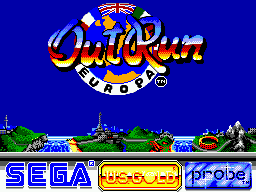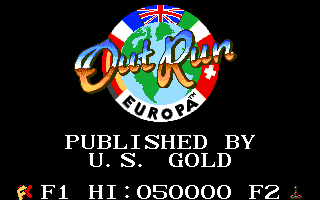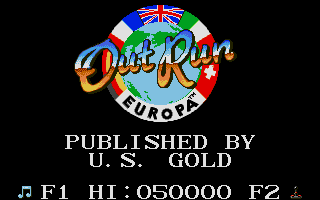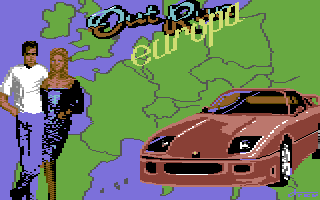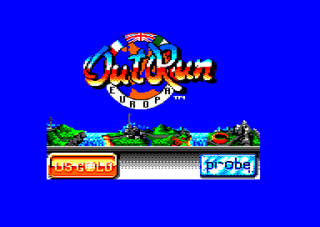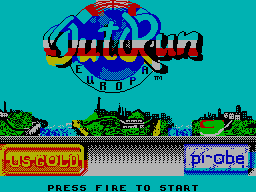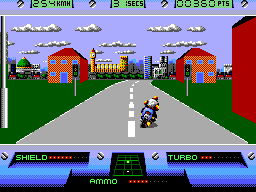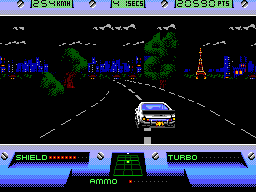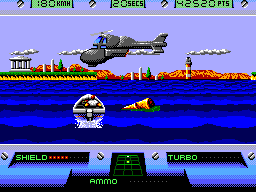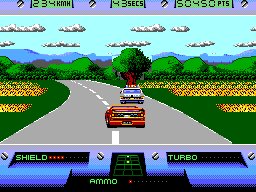OutRun Europa is an entry to the OutRun series, developed by Probe Software and published by U.S. Gold for the Sega Master System, Sega Game Gear, Amiga, Amstrad CPC, Atari ST, Commodore 64 and ZX Spectrum in 1991. Though it carries the OutRun brand, it has little to do with Sega Enterprises, Ltd. or Sega AM2 who were responsible for the original arcade game. The working title for this game was OutRun Europe.
Story
Simeon Kurtz is an intelligence agent tasked with traveling to Berlin to discretely deliver some classified documents. However, before he can get there, he has his Ferrari containing the documents stolen in London by counterintelligence agents. He immediately sets off on a chase across Europe to retrieve the Ferrari and the documents.
Gameplay
It is a driving game similar to its namesake, but it adds combat elements akin to Battle OutRun. The player drives a variety of vehicles, including a motorbike and a jet ski, and only drives a Ferrari, the series staple, in the last stage. Vehicles are steered with  and
and  . Vehicles accelerate with
. Vehicles accelerate with  and slow down with
and slow down with  . All vehicles have some means of offense with
. All vehicles have some means of offense with  . On the motorbike, the character punches nearby targets, similar to Road Rash. The other vehicles have projectile weapons with limited ammunition, which can be collected from pick-ups while driving. The land vehicles have turbo boosts that can be initiated by pressing
. On the motorbike, the character punches nearby targets, similar to Road Rash. The other vehicles have projectile weapons with limited ammunition, which can be collected from pick-ups while driving. The land vehicles have turbo boosts that can be initiated by pressing  . These are also limited and can be collected from pick-ups on the road.
. These are also limited and can be collected from pick-ups on the road.
Like other OutRun games, the objective is to make it to the next checkpoint before time runs out. Time is refreshed at the checkpoint. The player is also given one shield unit for passing a checkpoint. Occasionally, on the land stages, the game offers branching paths. The shorter path is recommended by a red arrow, but the player can choose to take the other path for additional challenge or to collect additional power-up items.
Other vehicles largely act as obstacles and deterrents, though there are now enemy vehicles that are outwardly hostile to the player. These enemies can be defeated by hitting them with the player's attack or by ramming them off the road, or enemies can be evaded by outrunning them (particularly with the use of turbo boosts). The player's vehicle has a shield that diminishes whenever it takes damage. It too can be replenished by item pick-ups. The player also takes damage from hitting roadside objects. In addition, the land stages have police officers that pursue the player. Like enemies, police can be defeated by attacking them, or the player can try to avoid them by speeding past. If the player's shield sustains too much damage and the vehicle is destroyed, if a police officer manages to stop the player, or if the timer reaches zero, the game ends. The game has no lives or continues. Shields, ammo, and turbo boosts are retained from stage to stage. The player is given three more shield units at the beginning of each stage.
Items
|
|
Shield
|
| Increases the shield by one unit, up to a maximum of 10. The game starts with 10.
|
|
|
Ammo
|
| Increases the ammunition by one unit, up to a maximum of 10. The game starts with 5.
|
|
|
Turbo
|
| Gives the player another turbo charge, up to a maximum of 10. The game starts with 5.
|
Levels
|
|
London - Dover
|
| The player rides a motorbike.
|
|
|
Dover - Calais
|
| The player rides a jet ski.
|
|
|
Calais - Paris - Barcelona - Madrid - Spanish Coast
|
| The player drives a Porsche 911.
|
|
|
Spanish Coast - Across the Mediterranean - Italian Coast
|
| The player pilots a boat.
|
|
|
Italian Coast - Austria - Berlin
|
| The player drives a Ferrari F40.
|
Versions
The Game Gear version of the game runs in the system's Master System compatibility mode.[14]
ZX Spectrum controversy
Despite falling victim to similar problems with the the original OutRun, UK Spectrum magazine Your Sinclair published misleading screenshots (and a review) of the game that did not accurately represent the final product[15]. Most notably, their version was in colour (and was reviewed favourably, owed in part to this), while the final game was presented in monochrome.
A colour version of the game can be accessed by using the POKE commands:
POKE 24905,0
POKE 24906,0
However, the results still do not match the screenshots in Your Sinclair and are considered by many to look worse than the monochrome version (likely explaining why the feature was turned off). Modifications by fans have resulted in more accurate colours, but the screenshots provided by U.S. Gold are thought to be mockups.
Furthermore the ending graphics were stolen from Ocean Software's Spectrum port of Chase H.Q..
History
The Game Gear version was once scheduled to be published in Japan by Sega.[16]
Production credits
Amiga version
Commodore 64 version
- Published by: U.S. Gold
- Developed by: Probe Software Ltd
- Produced by: Neil Young
- Programmed by: Neil Coxhead
- Graphics by: Mak Computer Grafx and Drew Northcott
- Sound and Music by: Jeroen Tel
- Copyright 1991 Sega
Magazine articles
- Main article: OutRun Europa/Magazine articles.
Promotional material
- Main article: OutRun Europa/Promotional material.
Physical scans
Master System version
| {{{{{icon}}}|L}}
|
Division by zero.
|
Based on
0 review
|
| Master System, EU
|
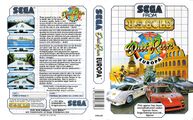 Cover
|
 Cart |
| Master System, EU (re-release)
|
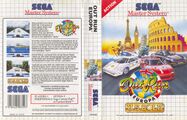 Cover
|
|
|
| Master System, PT
|
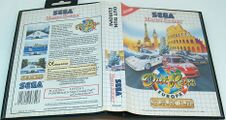 Cover
|
|
|
| Master System, AU (Hotline sticker)
|
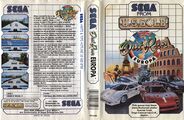 Cover
|
|
|
| Master System, AU (NIAL sticker)
|
 Cover
|
  Cart |
| Master System, BR
|
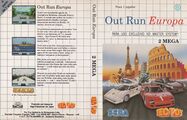 Cover
|
 Cart  Manual |
Game Gear version
| {{{{{icon}}}|L}}
|
Division by zero.
|
Based on
0 review
|
| Game Gear, US
|
|
|
 Cart  Manual |
| Game Gear, EU
|
|
|
 Cart  Manual |
| Game Gear, BR
|
|
|
 Cart |
Amiga version
| {{{{{icon}}}|L}}
|
Division by zero.
|
Based on
0 review
|
| Amiga, UK
|
 Cover
|
|
|
Amstrad CPC version
| Amstrad CPC, UK (cassette)
|
|
|
 Cassette |
| Amstrad CPC, UK (Kixx)
|
 Cover
|
|
|
| Amstrad CPC, ES (disk)
|
|
|
 Disk |
Atari ST version
| {{{{{icon}}}|L}}
|
Division by zero.
|
Based on
0 review
|
| Atari ST, UK
|
|
|
 Disk 1  Disk 2 |
Commodore 64 version
| {{{{{icon}}}|L}}
|
Division by zero.
|
Based on
0 review
|
| Commodore 64, UK (Kixx)
|
 Cover
|
 Cassette |
ZX Spectrum version
| {{{{{icon}}}|L}}
|
Division by zero.
|
Based on
0 review
|
| ZX Spectrum, UK (Kixx)
|
 Cover
|
|
|
Technical information
ROM dump status
| System |
Hash |
Size |
Build Date |
Source |
Comments |
|
|
|
| ?
|
| CRC32
|
3932adbc
|
| MD5
|
458fc29765865fdaaf3f56808c94d8a6
|
| SHA-1
|
c8fbf18eabdcf90cd70fc77444cf309ff47f5827
|
|
256kB
|
|
Cartridge (EU)
|
|
|
|
|
| ?
|
| CRC32
|
01eab89d
|
| MD5
|
bf5bd4d774600a866c2620e101845de8
|
| SHA-1
|
0fb4200fa291fe57cd7be2ee73ac2d71ae3c005e
|
|
256kB
|
|
Cartridge (EU)
|
|
|
|
|
| ?
|
| CRC32
|
f037ec00
|
| MD5
|
2a3bdd1a6c35eeedbf1a794abfb57b87
|
| SHA-1
|
dd842a7294eee7badf4353fbe3e5d87dd570c671
|
|
256kB
|
|
Cartridge (US)
|
|
|
|
|
References
- ↑ File:OutRunEuropa GG EU Box Back.jpg
- ↑ File:OutRunEuropa SMS EU Box.jpg
- ↑ 3.0 3.1 Sega Pro, "December 1991" (UK; 1991-11-21), page 34
- ↑ Sega Pro, "February 1992" (UK; 1992-01-16), page 7
- ↑ 5.0 5.1 Sega Power, "January 1992" (UK; 1991-12-05), page 32
- ↑ 6.0 6.1 Game Zone, "December 1991" (UK; 1991-11-22), page 49
- ↑ 7.0 7.1 7.2 7.3 7.4 7.5 7.6 7.7 Computer & Video Games, "August 1991" (UK; 1991-07-15), page 128
- ↑ 8.0 8.1 8.2 8.3 ACE, "December 1991" (UK; 1991-11-08), page 104
- ↑ 9.0 9.1 GamePro, "June 1992" (US; 1992-xx-xx), page 84
- ↑ Computer Trade Weekly, "" (UK; 1992-11-23), page 18
- ↑ Computer Trade Weekly, "" (UK; 1992-11-23), page 18
- ↑ 12.0 12.1 Computer & Video Games, "August 1992 (Go! Issue 10)" (UK; 1992-07-15), page 12
- ↑ Sega Zone, "November 1992" (UK; 1992-10-28), page 80
- ↑ https://www.smspower.org/Tags/SMS-GG
- ↑ 15.0 15.1 Your Sinclair, "November 1991" (UK; 1991-10-03), page 46
- ↑ https://www.smspower.org/forums/6851-RumouredGameGearReleases (Wayback Machine: 2021-06-13 03:25)
- ↑ Console XS, "June/July 1992" (UK; 1992-04-23), page 143
- ↑ Mean Machines: The Essential Sega Guide, "" (UK; 1993-11-18), page 147
- ↑ Game Power, "Febbraio 1992" (IT; 1992-0-xx), page 42
- ↑ GamesMaster (UK) "Series 1, episode 3" (1992-01-21, 24:00) (+6:45)
- ↑ Hobby Consolas, "Enero 1992" (ES; 199x-xx-xx), page 22
- ↑ Mega Force, "Novembre 1991" (FR; 1991-11-19), page 91
- ↑ Mean Machines, "December 1991" (UK; 1991-11-28), page 154
- ↑ Mean Machines Sega, "October 1992" (UK; 1992-09-xx), page 135
- ↑ Player One, "Février 1992" (FR; 1992-xx-xx), page 86
- ↑ Play Time, "4/92" (DE; 1992-03-04), page 90
- ↑ Sega Pro, "April 1993" (UK; 1993-03-11), page 71
- ↑ Sega Force, "January 1992" (UK; 1991-12-12), page 70
- ↑ Video Games, "1/92" (DE; 1992-02-03), page 38
- ↑ Bad Influence!, "Christmas 1992" (UK; 1992-11-19), page 92
- ↑ Consoles +, "Janvier 1993" (FR; 199x-xx-xx), page 142
- ↑ Electronic Gaming Monthly, "May 1992" (US; 1992-xx-xx), page 32
- ↑ Mean Machines: The Essential Sega Guide, "" (UK; 1993-11-18), page 168
- ↑ GameFan, "Volume 1, Issue 1: October 1992" (US; 1992-xx-xx), page 51
- ↑ Game Power, "Gennaio 1993" (IT; 199x-xx-xx), page 85
- ↑ Game Zone, "July 1992" (UK; 1992-06-24), page 55
- ↑ Joypad, "Décembre 1992" (FR; 1992-1x-xx), page 156
- ↑ Joystick, "Décembre 1992" (FR; 1992-1x-xx), page 164
- ↑ Mean Machines Sega, "December 1992" (UK; 1992-11-xx), page 120
- ↑ Play Time, "1/93" (DE; 1992-12-09), page 85
- ↑ Sega Power, "August 1992" (UK; 1992-07-02), page 46
- ↑ Sega Pro, "July 1992" (UK; 1992-06-18), page 48
- ↑ Sega Pro, "April 1993" (UK; 1993-03-11), page 74
- ↑ Sega Zone, "November 1992" (UK; 1992-10-28), page 79
- ↑ Sega Force, "2/93" (SE; 1993-03-18), page 23
- ↑ Sega Force, "January 1993" (UK; 1992-12-10), page 74
- ↑ Supersonic, "Mars 1993" (FR; 1993-xx-xx), page 29
- ↑ Video Games, "12/92" (DE; 1992-11-23), page 132
- ↑ Amiga Joker, "November 1991" (DE; 1991-10-31), page 10
- ↑ Amiga Power, "November 1991" (UK; 1991-10-24), page 44
- ↑ Games-X, "12th-18th September 1991" (UK; 1991-09-12), page 21
- ↑ Joystick, "Novembre 1991" (FR; 1991-1x-xx), page 252
- ↑ Micromanía (segunda época), "Diciembre 1991" (ES; 1991-1x-xx), page 44
- ↑ User, "Dekémvrios 1991" (GR; 1991-1x-xx), page 62
- ↑ ST Action, "October 1993" (UK; 1993-09-02), page 28
- ↑ Aktueller Software Markt, "Februar 1992" (DE; 1992-01-10), page 112
- ↑ Commodore Format, "September 1991" (UK; 1991-08-15), page 20
- ↑ Your Commodore, "October 1991" (UK; 1991-09-27), page 39
- ↑ Zzap!64, "September 1991" (UK; 1991-08-08), page 64
- ↑ Zzap!, "Settembre 1991" (IT; 1991-xx-xx), page 32
![]() and
and ![]() . Vehicles accelerate with
. Vehicles accelerate with ![]() and slow down with
and slow down with ![]() . All vehicles have some means of offense with
. All vehicles have some means of offense with ![]() . On the motorbike, the character punches nearby targets, similar to Road Rash. The other vehicles have projectile weapons with limited ammunition, which can be collected from pick-ups while driving. The land vehicles have turbo boosts that can be initiated by pressing
. On the motorbike, the character punches nearby targets, similar to Road Rash. The other vehicles have projectile weapons with limited ammunition, which can be collected from pick-ups while driving. The land vehicles have turbo boosts that can be initiated by pressing ![]() . These are also limited and can be collected from pick-ups on the road.
. These are also limited and can be collected from pick-ups on the road.
